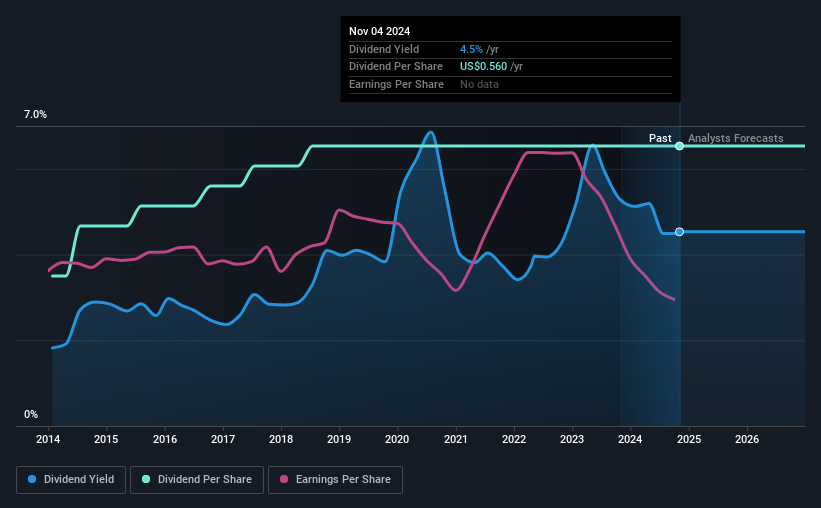- United States
- /
- Banks
- /
- NasdaqGS:HOPE
Dividend Investors: Don't Be Too Quick To Buy Hope Bancorp, Inc. (NASDAQ:HOPE) For Its Upcoming Dividend

Hope Bancorp, Inc. (NASDAQ:HOPE) is about to trade ex-dividend in the next 2 days. Typically, the ex-dividend date is one business day before the record date which is the date on which a company determines the shareholders eligible to receive a dividend. The ex-dividend date is an important date to be aware of as any purchase of the stock made on or after this date might mean a late settlement that doesn't show on the record date. Therefore, if you purchase Hope Bancorp's shares on or after the 7th of November, you won't be eligible to receive the dividend, when it is paid on the 21st of November.
The company's next dividend payment will be US$0.14 per share. Last year, in total, the company distributed US$0.56 to shareholders. Based on the last year's worth of payments, Hope Bancorp stock has a trailing yield of around 4.5% on the current share price of US$12.36. Dividends are a major contributor to investment returns for long term holders, but only if the dividend continues to be paid. That's why we should always check whether the dividend payments appear sustainable, and if the company is growing.
See our latest analysis for Hope Bancorp
Dividends are usually paid out of company profits, so if a company pays out more than it earned then its dividend is usually at greater risk of being cut. Hope Bancorp paid out more than half (66%) of its earnings last year, which is a regular payout ratio for most companies.
When a company paid out less in dividends than it earned in profit, this generally suggests its dividend is affordable. The lower the % of its profit that it pays out, the greater the margin of safety for the dividend if the business enters a downturn.
Click here to see the company's payout ratio, plus analyst estimates of its future dividends.

Have Earnings And Dividends Been Growing?
When earnings decline, dividend companies become much harder to analyse and own safely. If earnings decline and the company is forced to cut its dividend, investors could watch the value of their investment go up in smoke. With that in mind, we're discomforted by Hope Bancorp's 10% per annum decline in earnings in the past five years. Such a sharp decline casts doubt on the future sustainability of the dividend.
The main way most investors will assess a company's dividend prospects is by checking the historical rate of dividend growth. In the last 10 years, Hope Bancorp has lifted its dividend by approximately 6.4% a year on average. Growing the dividend payout ratio while earnings are declining can deliver nice returns for a while, but it's always worth checking for when the company can't increase the payout ratio any more - because then the music stops.
The Bottom Line
Should investors buy Hope Bancorp for the upcoming dividend? Earnings per share have been declining and the company is paying out more than half its profits to shareholders; not an enticing combination. This is not an overtly appealing combination of characteristics, and we're just not that interested in this company's dividend.
Having said that, if you're looking at this stock without much concern for the dividend, you should still be familiar of the risks involved with Hope Bancorp. Case in point: We've spotted 1 warning sign for Hope Bancorp you should be aware of.
A common investing mistake is buying the first interesting stock you see. Here you can find a full list of high-yield dividend stocks.
Valuation is complex, but we're here to simplify it.
Discover if Hope Bancorp might be undervalued or overvalued with our detailed analysis, featuring fair value estimates, potential risks, dividends, insider trades, and its financial condition.
Access Free AnalysisHave feedback on this article? Concerned about the content? Get in touch with us directly. Alternatively, email editorial-team (at) simplywallst.com.
This article by Simply Wall St is general in nature. We provide commentary based on historical data and analyst forecasts only using an unbiased methodology and our articles are not intended to be financial advice. It does not constitute a recommendation to buy or sell any stock, and does not take account of your objectives, or your financial situation. We aim to bring you long-term focused analysis driven by fundamental data. Note that our analysis may not factor in the latest price-sensitive company announcements or qualitative material. Simply Wall St has no position in any stocks mentioned.
About NasdaqGS:HOPE
Hope Bancorp
Operates as the bank holding company for Bank of Hope that provides retail and commercial banking services for businesses and individuals in the United States.
Flawless balance sheet established dividend payer.


